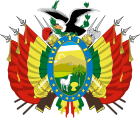
Back Präsidentschafts- und Parlamentswahl in Bolivien 2019 German Βολιβιανές γενικές εκλογές (2019) Greek Elecciones generales de Bolivia de 2019 Spanish انتخابات سراسری بولیوی (۲۰۱۹) Persian Élections générales boliviennes de 2019 French Բոլիվիայի համընդհանուր ընտրություններ (2019) Armenian Elezioni generali in Bolivia del 2019 Italian Eleições gerais na Bolívia em 2019 Portuguese Всеобщие выборы в Боливии (2019) Russian 2019 Bolivian general election SIMPLE
| |||||||||||||||||||||||||
| Turnout | 88.31% ( | ||||||||||||||||||||||||
|---|---|---|---|---|---|---|---|---|---|---|---|---|---|---|---|---|---|---|---|---|---|---|---|---|---|
|
| |||||||||||||||||||||||||
Presidential election | |||||||||||||||||||||||||
| |||||||||||||||||||||||||
 Results by department | |||||||||||||||||||||||||
| |||||||||||||||||||||||||
 |
|---|
|
|
General elections were held in Bolivia on 20 October 2019. Voters elected all 130 members of the Chamber of Deputies and 36 senators and cast ballots for a joint slate of president and vice president. The Bolivian constitution allows the President and Vice-President to put themselves forward for re-election only once, limiting the number of terms to two, and the elections took place after in 2016 a referendum to amend the constitution was rejected, but that the Supreme Court of Justice ruled that all public offices would have no term limits despite what was established in the constitution and allowing Morales to run for a fourth term.[1]
Disputes over the transparency and legitimacy of the elections prompted weeks of widespread protests in Bolivia after incumbent President Evo Morales was declared the winner with 47.08% of the vote; because this was greater than a ten-point margin over his nearest competitor, Carlos Mesa, this was enough for Morales to be announced as a winner without a run-off second-round vote.[2][3] The Organization of American States (OAS) conducted an audit claiming "clear manipulation" and significant irregularities,[4] releasing a full report afterwards.[5][6][7] The European Union released a report indicating that their observers found many irregularities and chaotic processes in the election.[8][9] The New York Times later concluded on the basis of a new study by independent researchers and academics that the initial report was flawed as it was released too early, relied on poor datasets and used inappropriate statistical methods. The study found that there was no statistical evidence of voter fraud as the audit had claimed; OAS stood by their report but refused to disclose the full methodology and dataset.[10]
Following protests, as well as calls for a second-round election from several foreign countries,[3] Morales, who had pledged to respect the OAS audit, agreed on 10 November to hold new elections,[4] at a date to be determined.[2] Hours later he and his vice president Álvaro García Linera were forced to resign from office after losing support from the police, the Bolivian Workers' Center and the military.[11][12] The President of the Senate and the President of the Chamber of Deputies – both party allies of Morales – resigned on the same day, exhausting the constitutional line of succession. As a result, the second vice president of the Senate, Jeanine Áñez of the opposition Social Democratic Movement, assumed the interim presidency of Bolivia on 12 November 2019.[13] Due to the annulment of the 2019 elections, MAS retained their supermajority of more than two-thirds in both chambers in opposition to the government, although they would lose this in the 2020 elections.[14]
The 2019 elections were to be rerun in May 2020, but were postponed due to the COVID-19 pandemic. On 22 June 2020, Áñez approved a law passed by both the Chamber of Deputies and the Senate to set a date for the election for 6 September 2020 and the elected authorities in place by mid to late November 2020.[15][16]
- ^ Cite error: The named reference
:4was invoked but never defined (see the help page). - ^ a b Bolivia's Morales to call fresh election after OAS audit, BBC News (10 November 2019).
- ^ a b "Bolivia protests as Morales declared poll winner". BBC News. 25 October 2019.
- ^ a b Anthony Faiola & Rachelle Krygier, Bolivia's Morales agrees to new elections after OAS finds 'manipulation', Washington Post (10 November 2019).
- ^ Cite error: The named reference
:0was invoked but never defined (see the help page). - ^ Cite error: The named reference
:2was invoked but never defined (see the help page). - ^ Cite error: The named reference
:3was invoked but never defined (see the help page). - ^ "Unión Europea Misiónde Expertos Electorales Bolivia 2019 Informe Final" (PDF) (in Spanish). European Union in Bolivia. Archived from the original on 6 July 2020. Retrieved 15 October 2020.
{{cite web}}: CS1 maint: unfit URL (link) - ^ "Informe de la UE detectó "numerosos errores" en elecciones de Bolivia | Voice of America - Spanish". www.voanoticias.com (in Spanish). Voice of America Spanish. 21 December 2019. Retrieved 15 October 2020.
- ^ Kurmanaev, Anatoly (7 June 2020). "A Bitter Election. Accusations of Fraud. And Now Second Thoughts". The New York Times.
- ^ Ernesto Londoño, Bolivian Leader Evo Morales Steps Down, New York Times (10 November 2019).
- ^ Véliz, Juan Carlos. "Testimonios corroboran que a Evo le falló la estrategia de la renuncia colectiva y que avaló la transición de Añez". Brújula Digital. Retrieved 4 September 2023.
- ^ "Bolivia crisis: Jeanine Áñez assumes interim presidency". BBC News. 13 November 2019.
- ^ "The MAS did not reach 2/3 in two of the last four elections" (in Spanish). 25 October 2020.
- ^ "After warning of risk, Añez promulgates the law of elections between reproaches of MAS and CC" (in Spanish). 22 June 2020.
- ^ "See the electoral calendar for 2020 elections". 26 June 2020.


